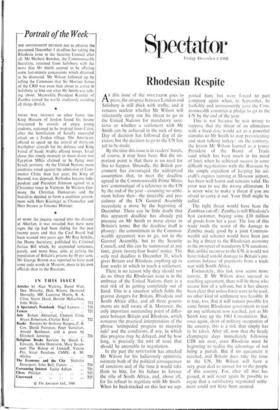Rhodesian Respite
As this issue of the si,t_ci A lox goes to press, the airspace between London and Salisbury is still thick with traffic, and it remains unclear whether Mr Wilson will reluctantly carry out his threat to go to the United Nations for mandatory sanc- tions or whether a settlement with Mr Smith can be achieved in the nick of time. Day of decision has followed day of de- cision; but the decision to go to the UN has yet to be made.
By the time this issue is in readers' hands, of course, it may have been. But the im- portant point is that there is no need for this to happen. Shrewdly, the British gov- ernment has encouraged the widespread assumption that, to meet the deadline agreed in the Commonwealth Prime Minis- ters' communiqué of a reference to the UN by the end of the year—assuming no settle- ment before then—the timetable and pro- cedures of the UN General Assembly necessitate a move by the beginning of December. There can be little doubt that this apparent deadline has already put pressure on Mr Smith to move closer to Britain's terms. But the deadline itself is phoney: the commitment in the Common- wealth agreement was to go, not to the General Assembly, but to the Security Council, and this can be summoned at any time, given twenty-four hours' notice. The only real deadline is December 31, which gives Britain and Rhodesia anything up to four weeks in which to reach a settlement.
There is no reason why they should not do so. Once the Rhodesian issue is in the embrace of the United Nations there is a real risk of its getting completely out of hand. This is a situation which holds the gravest dangers for Britain, Rhodesia and South Africa alike, and all three govern- ments are well aware of it. Moreover, the only important outstanding point of differ- ence between Britain and Rhodesia, which concerns the practical interpretation of the phrase 'unimpeded progress to majority rule' and the conditions, if any, in which this progress may be delayed, and by how long, is precisely the sort of issue that should be amenable to negotiation.
In the past the SPECTATOR has attacked Mr Wilson for his ludicrously optimistic estimate both of the political consequences of sanctions and of the time it would take them to bite, for his failure to foresee the role of South Africa, and, above all, for his refusal to negotiate with Mr Smith. When he back-tracked on this last we sup- ported him; but were forced to part company again when, in September. he foolishly and unnecessarily gave the Com- monwealth countries a pledge to go to the UN by the end of the year.
This is not because he was wrong to suppose that the threat of an ultimatum with a fixed date would act as a powerful stimulus to Mr Smith to stop prevaricating and start talking turkey : on the contrary, the lesson Mr Wilson learned as a young President of the Board of Trade (and which has been much in his mind of late), when he achieved success in some difficult negotiations with the Russians by the simple expedient of keeping his air- craft's engines running at Moscow airport, has been well learnt and remains valid. His error was to use the wrong ultimatum. It is never wise to make a threat if you are afraid to carry it out. Your bluff might be called.
The right threat would have been the Zambian cut-off: Zambia is still Rhodesia's best customer, buying some £30 million of goods from her a year. The loss of this trade (with the worst of the damage to Zambia made good by a joint Common- wealth aid scheme) would have been just as big a threat to the Rhodesian economy as the prospect of mandatory UN sanctions. But, unlike recourse to the UN, it would not have risked untold damage to Britain's pre- carious balance of payments from a trade war with South Africa.
Fortunately, this risk now seems more remote. If Mr Wilson does succeed in reaching agreement, there will be those who accuse him of a sell-out; but it has always been clear that unless force were to be used, no other kind of settlement was feasible. It is true, too, that it will remain possible for some future Rhodesian government to tear up any settlement now reached, just as Mr Smith tore up the 1961 Constitution. But, once again, short of military occupation of the country, this is a risk that simply has to be taken. After all, now that the heady champagne days immediately following UDI are over, even Rhodesia must be beginning to realise the advantage of not being a pariah. But if no agreement is reached, and Britain does take the issue to the UN, Mr Wilson will have a very great deal to answer for to the people of this country. For, after all that has passed, it will never again be possible to argue that a satisfactory negotiated settle- ment could not have been secured.


































 Previous page
Previous page